|
| |

Foghat specialized in a simple, hard-rocking blues-rock, releasing a series of
best-selling albums in the mid-'70s. While the group never deviated from their basic
boogie, they retained a large audience until 1978, selling out concerts across America and
earning five gold albums, as well as two platinum. Once punk and disco came along, the
band's audience dipped dramatically, yet the group continued performing until 1980.
With its straight-ahead, three-chord romps, the band's sound was American in origin,
yet the members were all natives of England. Guitarist/vocalist "Lonesome" Dave
Peverett, bassist Tony Stevens, and drummer Roger Earl were members of the British blues
band Savoy Brown, who all left the group in the early '70s. Upon their departure, they
formed Foghat with guitarist Rod Price. Foghat moved to the United States, signing a
record contract with Bearsville Records, a new label run by Albert Grossman. Their first
album, Foghat, was released in the summer of 1972 and it became an album rock hit; a cover
of Willie Dixon's "I Just Want to Make Love to You" even made it to the lower
regions of the singles charts. For their next album, the group didn't change their formula
at all - in fact, they didn't even change the title of the album. Like the first record,
the second was called Foghat; it was distinguished by a picture of a rock and a roll on
the front cover. Foghat's second album was their first gold record, and it established
them as a popular arena rock act. Their next six albums - Energized (1974), Rock and Roll
Outlaws (1974), Fool for the City (1975), Night Shift (1976), Foghat Live (1977), Stone
Blue (1978) - all were best-sellers and all went at least gold. "Slow Ride,"
taken from Fool for the City, was their biggest single, peaking at number 20. Foghat Live
was their biggest album, selling over two million copies. After 1975, the band went
through a series of bass players; Price left the band in 1981 and was replaced by Erik
Cartwright.
In the early '80s, Foghat's commercial fortunes declined rapidly, with their last
album, 1983's Zig-Zag Walk, barely making the album charts. The group broke up shortly
afterward, although they reunited for various tours in the late '80s and early '90s,
releasing Road Cases in 1998. Peverett died of cancer on February 7, 2000.
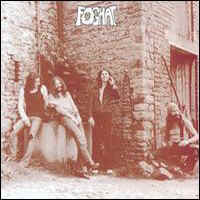
Foghat - 1972
Breaking away from Savoy Brown to form this band, the members of Foghat knew from the
start what sort of record they wanted to make. With heavy emphasis on the hard boogie,
Foghat got down to work with the help of Dave Edmunds and crafted a hard rock gem.
Covering Chuck Berry's "Maybellene," they goosed the beat up until it was almost
a precursor of the heavy metal yet to come. Interspersing covers with original material,
they immediately found a place for themselves in the rock world. - James Chrispell
1 - (4:26) I Just Want To Make Love To You
2 - (3:24) Trouble, Trouble
3 - (3:40) Leavin' Again (Again!)
4 - (3:03) Fool's Hall Of Fame
5 - (4:41) Sarah Lee
6 - (3:56) Highway (Killing Me)
7 - (3:41) Maybellene
8 - (4:11) A Hole To Hide In
9 - (7:47) Gotta Get To Know You

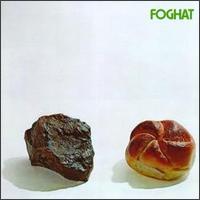
Rock 'N' Roll - 1973
Foghat's second album finds the group working its way towards the fusion of blues and
hard rock that would make them an arena rock favorite. They were not yet the stadium kings
they would soon become, but Rock and Roll benefits from a muscular production that gives
the band a muscular sound worthy of their impressive live act. A good example is the
powerful album opener "Ride, Ride, Ride": Lonesome Dave Peverett wails over a
boogie beat fortified by rumbling power chords as gospel-style backup vocalists cheer him
on at the chorus. "Road Fever" is another choice rocker, a song about the rock
& roll touring life (a recurrent Foghat song subject) that spices up its fuzz guitar
rock with a rubbery bass line and a attractive but non-intrusive horn section. However,
not everything on Rock and Roll is as inspired as these two tracks: songs like "Feel
So Bad" and "She's Gone" succumb to cliché boogie-rock lyrics that are as
dull as their titles and plodding song structures that lack hooks and inventive
arrangements. Despite this occasional lack of inspiration, the band manages to pull off a
few surprises here and there that show they were looking forward: "Helping Hand"
crossbreeds the band's boogie sound with acoustic country-rock touches to create a tune
that sounds like the Eagles on steroids, and the power ballad "It's Too Late"
succeeds despite its cliché lost-love lyrics, thanks to a sharp arrangement that shows
off the sharp guitar interplay between Peverett and Rod Price. All in all, Rock and Roll
lacks the consistent material to win over casual rock fans, but any Foghat enthusiast will
find plenty to enjoy on this disc. - Donald A. Guarisco
1 - (4:26) Ride, Ride, Ride
2 - (5:10) Feel So Bad
3 - (5:08) Long Way To Go
4 - (5:46) It's Too Late
5 - (3:53) What A Shame
6 - (4:42) Helpin' Hand
7 - (4:23) Road Fever
8 - (3:14) She's Gone
9 - (1:58) Couldn't Make Her Stay

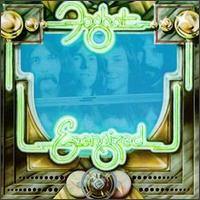
Energized - 1974
The third album proved to be the charm for Foghat. On Energized, their fusion of blues
song structures and heavy metal energy comes into sharp focus. The group storms out of the
gate with the opening track, "Honey Hush"; this inspired reworking of a blues
classic moves like a locomotive about to run off the rails and dazzles the listener with a
barrage of furious, metallic guitar riffs. Another sharp rocker along these lines is
"Wild Cherry," a lascivious tribute to a gorgeous woman that is fuelled by a
double-time beat from Roger Earl and some killer twin-guitar riffing from Dave Peverett
and Rod Price. Elsewhere, the group keeps things interesting by experimenting with their
formula: an inspired cover of the Buddy Holly chestnut "That'll Be the Day"
successfully recasts it as a bluesy vamp complete with saucy horn arrangements, and
"Step Outside" mixes funk-styled instrumental breakdowns and a bass line that
would be at home on a James Brown record into its hard rock song structure to create an
effective funk-rock hybrid. Energized also produced an enduring classic for the band with
"Home in My Hand," an autobiographical tale about living a life dominated by
wanderlust. It provided a fitting anthem for a band that toured incessantly and quickly
became a beloved part of the Foghat's live set. The one real downside of Energized is that
the band gets so carried away sometimes that they let their songs go on a little too long.
The notable example here is set-closer "Nothin' I Won't Do," an amiable blues
shuffle that is inflated to an unwieldy seven minutes by a few too many guitar solos.
However, the album rises above these occasional dips into excess thanks to solid songs and
inspired performance from the band. In short, Energized is a solid listen for anyone who
gets nostalgic about 1970s arena rock, and a must-have for Foghat fans. - Donald A.
Guarisco
1 - (4:23) Honey Hush
2 - (6:21) Step Outside
3 - (4:05) Golden Arrow
4 - (5:15) Home In My Hand
5 - (5:29) Wild Cherry
6 - (2:54) That'll Be The Day
7 - (4:49) Fly By Night
8 - (6:58) Nothin' I Won't Do


Rock And Roll Outlaws - 1974
After establishing a new level of credibility on record with 1974's Energized, Foghat
cranked out another album of boogie rock before the year ended. The result, Rock and Roll
Outlaws, is not as consistently inspired as its predecessor but remains a worthwhile
listen for the group's fans. This time out, the group settles for a more straight-forward
boogie sound that downplays the experiments that spiced up Energized. As a result, the
songs are often solid but uninspiring: "Trouble in My Way" has some pleasant
acoustic guitar work but feels like a throwaway tune while the title track cruises along
in an amiable fashion but never catches fire the way a song with a title like "Rock
and Roll Outlaw" should. However, when the band is firing on all four cylinders, Rock
and Roll Outlaws is a joy: "Eight Days on the Road" is a hard-charging tune
about the touring life that became a live favorite, and the good-time raver "Chateau
Lafitte '59 Boogie" is one of the most exhilarating rockers in the Foghat catalog.
"Blue Spruce Woman" is another crafty rocker, benefiting from a witty lyric
about a nature-loving woman and some of the gutsiest guitar riffs on the album. It should
also be noted that these high points are given an additional shot in the arm by Nick
Jameson's sympathetic production, which manages to bring out a sharpness of detail in the
sound without cutting back on its heaviness. Overall, Rock and Roll Outlaws probably has
limited appeal to the casual listener but offers enough energetic boogie rock to make it
worthwhile for anyone into Foghat. - Donald A. Guarisco
1 - (6:10) Eight Days On The Road
2 - (4:41) Hate To See You Go
3 - (6:41) Dreamer
4 - (3:33) Trouble In My Way
5 - (3:55) Rock And Roll Outlaw
6 - (3:48) Shirley Jean
7 - (4:10) Blue Spruce Woman
8 - (6:19) Chateau Lafitte '59 Boogie

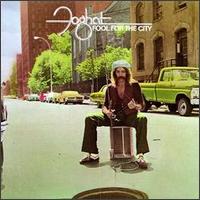
Fool For The City - 1975
After building a solid core audience through relentless touring and a string of
hard-rocking albums, Foghat finally hit the big time in 1975 with Fool for the City. It
still stands out as the best album in the group's catalog because it matched their
road-tested abilities as hard rockers to a consistent set of tunes that were both
well-crafted and ambitious. The tone for the album is set by its title track: This
hard-rocking gem not only pairs riff-driven verses with an effective shout-along chorus,
but also throws in a few surprising moments where the guitars are taken out of the mix
completely and Nick Jameson's bass is allowed to take the lead in a funky breakdown. Fool
for the City also produced an enduring rock radio favorite in "Slow Ride," a
stomping rock tune that transcends the inherent clichés of its "love is like a car
ride" lyrics with a furious performance from the band and a clever arrangement that
works in well-timed automotive sound effects during the verses and plays up the band's
ability to work an R&B-styled groove into their hard-rocking sound (again, note the
thumping bass line from Jameson). Further radio play was earned with "Take It or
Leave It," an acoustic-based ballad that worked synthesizers into its subtle yet
carefully layered arrangement to become one of the group's finest slow numbers. The
album's other songs don't stand like the aforementioned selections, but they all flow
together nicely thanks to a consistently inspired performance from the band and clever
little arrangement frills that keep the group's boogie-oriented rock fresh (example: the
witty spoken word bit at the end of "Drive Me Home"). All in all, Fool for the
City is both Foghat's finest achievement in the studio and one the high points of 1970s
hard rock. - Donald A. Guarisco
1 - (4:33) Fool For The City
2 - (4:38) My Babe
3 - (8:17) Slow Ride
4 - (5:47) Terraplane Blues
5 - (3:33) Save Your Loving (For Me)
6 - (3:58) Drive Me Home
7 - (4:58) Take It Or Leave It

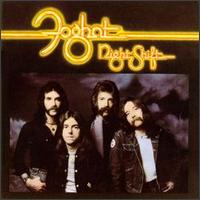
Night Shift - 1976
After hitting it big in the arena rock sweepstakes with Fool for the City, Foghat
continued along the same lines on 1976' s Night Shift. This time, ex-Edgar Winter sideman
Dan Hartman took the producer's chair. The result is a well-produced and solid hard rock
album that nonetheless feels disappointing because it lacks the consistently high levels
of energy and inspiration that marked its predecessor. This time, the hard-rocking
highlights included the title track, a powerhouse tune built on a strong combination of an
ascending guitar riff and rumbling bass line, and "Drivin' Wheel," an
automobile-themed slab of boogie rock that glides along on a stomping, cymbal-accented
beat and plenty of fat power chords. Night Shift also boasts one of the group's best
ballads in "I'll Be Standing By," an emotional number that boasts a
heart-tugging vocal performance from Lonesome Dave Peverett and a skillful arrangement
that plays off soaring electric guitar riffs against a lush string arrangement. Elsewhere,
the material is energetic but hit-and-miss in terms of its quality: "Drivin'
Wheel" is a fun but repetitive rocker that lacks any surprises in its rather monotone
arrangement, and "Hot Shot Love" is an uninspired attempt at creating a
radio-friendly mid-tempo tune. The end result is an album that offers enough highlights to
please Foghat's hardcore audience but is too inconsistent to keep the casual listener
interested. As a result, neophyte Foghat enthusiasts should probably sample Night Shift's
highlights on a compilation before deciding whether or not to pick it up. - Donald A.
Guarisco
1 - (5:15) Drivin' Wheel
2 - (6:34) Don't Run Me Down
3 - (5:40) Burnin' The Midnight Oil
4 - (5:34) Nightshift
5 - (4:03) Hot Shot Love
6 - (4:44) Take Me To The River
7 - (5:55) I'll Be Standing By

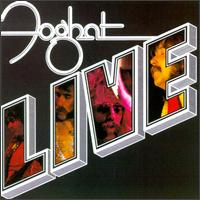
Foghat Live - 1977
Back in the day, this release was regularly cited in many a '70s live album Top Ten
list, but a few decades on, and with the concert experience so removed from that time
period (when smaller media exposure for rock & roll meant live albums were truly
unique, highly sought-after affairs), it's probably difficult for most modern listeners to
hear what the fuss was about. Still, in case you care, in their day, Lonesome Dave
Peverett and his crew were true road warriors, peddling their Anglicized blues-rock to
American audiences with power, conviction, and a blue-collar honesty - all of which are
captured here. Also, Foghat's studios albums were always pretty tough and gritty in their
own right, but on Foghat Live, whatever fluff or sleekness had managed to creep into hit
singles like "Fool for the City," "Home in My Hand," or the timeless
"Slow Ride" was stripped away to reveal the warts and scars beneath. And
speaking of warts and scars, it's no coincidence that Foghat's career died a death as soon
as MTV came around, making this live recording captured at their peak one for the road. -
Ed Rivadavia
1 - (5:33) Fool For The City [Live]
2 - (4:58) Home In My Hand [Live]
3 - (8:38) I Just Want To Make Love To You [Live]
4 - (5:31) Road Fever [Live]
5 - (5:40) Honey Hush [Live]
6 - (8:23) Slow Ride [Live]

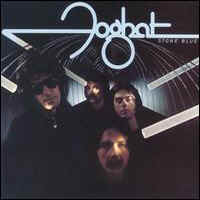
Stone Blue - 1978
After racking up huge sales with Live, Foghat found themselves forced to choose between
staying a hard rock cult group or trying to expand their success and become a full-on
commercial phenomenon. They decided to experiment with adding a commercial edge to their
sound and hired producing wiz Eddie Kramer (knob-twiddler for Jimi Hendrix and Kiss) to
help them find the right balance between guitar power and studio gloss. Sadly, the
resulting album, Stone Blue, is only intermittently successful because it never finds the
right balance to make this compromise work. A good example is the title track: It has all
the energy of a classic Foghat track and adds in some nice vocal harmonies, but it lacks
the thick, bass-heavy bottom end and the bluesy edge that fuelled the band's best songs.
This sonic schizophrenia goes even further on faceless songs like "High on Love"
and "Easy Money," which sound like they could have been cut by any 1970s AOR
band. Despite these moments of stylistic confusion, Foghat's old strengths manage to shine
through on occasion: "It Hurts Me Too" is an impressive blues cover that
features a searing vocal performance from Lonesome Dave Peverett, and
"Chevrolet" successfully marries boogie rock riffs to a slick studio sound.
However, the lack of a consistent overall direction keeps Stone Blue from being the
success it could have been. In the end, it offers enough solid tracks to please the
hardcore Foghat fan but casual listeners would better off checking out Fool for the City
or Live for a better, more consistent idea of the group's strengths. - Donald A. Guarisco
1 - (5:41) Stone Blue
2 - (4:01) Sweet Home Chicago
3 - (3:57) Easy Money
4 - (6:56) Midnight Madness
5 - (5:35) It Hurts Me Too
6 - (5:21) High On Love
7 - (3:23) Chevrolet
8 - (4:25) Stay With Me

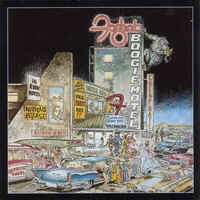
Boogie Motel - 1979
After toying with a more commercial sound on Stone Blue, Foghat decided to continue in
the same vein on their next album. The resulting album, Boogie Motel, brought the group
some commercial success but also unfortunately found them straying even further from their
trademark sound. The album's success was primarily derived from "Third Time Lucky
(First Time I Was a Fool)," a power ballad that became a hit single. It's lightweight
stuff, especially by the standard of past Foghat hits, but it benefits from a strong
melody and a tight arrangement that boasts some soaring slide-guitar leads. Sadly, it's
the one really good track on the album. The big problem with Boogie Motel is its
production downplays guitars in favor of an overall radio-friendly slickness. It's the
wrong strategy, because it makes a once-ferocious band sound positively toothless:
"Somebody's Been Sleepin' in My Bed" loses the dynamic power inherent in its
arrangement due to the blunted sound of the guitars and drums, and the title track's slick
arrangement (complete with horn arrangement) and radio-friendly mix make it sound pleasant
instead of ferocious. Boogie Motel also suffers from uninspired material that downplays
the band's classic boogie rock style for a more middle-of-the-road radio rock approach:
The worst example is "Comin' Down With Love," which suffers from painfully sappy
love lyrics and a dull soul-pop arrangement that strangely feels like an attempt to
emulate the sound of Boz Scaggs. All in all, Boogie Motel is a dull, disappointing album
that lacks the guitar firepower and rootsy charm that define the best Foghat albums. Even
the most devoted Foghat fanatics may want to think twice before picking this disc up. -
Donald A. Guarisco
1 - (3:52) Somebody's Been Sleepin' In My Bed
2 - (4:15) Third Time Lucky (First Time I Was A Fool)
3 - (5:26) Comin' Down With Love
4 - (5:40) Paradise Alley
5 - (7:24) Boogie Motel
6 - (4:33) Love In Motion
7 - (5:57) Nervous Release

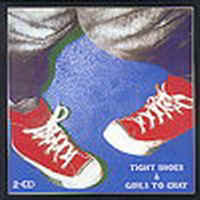
Tight Shoes - 1980
When Foghat founder Lonesome Dave Peverett (lead vocals and guitar) started his career
with Savoy Brown in the late '60s, there was still something progressive about young Brits
tackling American blues, R&B, and even some rockabilly, but as the musician entered
his third decade of recording, artistic compromises and commercial success had
watered-down the entire genre of blues-based hard rock, thanks largely to bands like his
own. Although Foghat had released a string of very successful recordings, the group's
final two releases of the '70s, Stone Blue and Boogie Motel, both suffered from declining
(although still substantial) sales. Peverett's response to the suddenly suspect viability
of his group's arena rock sound was to take his songwriting in a more modern (if not quite
fitting) direction on Tight Shoes. New wave and punk had emerged out of the U.K. in the
late '70s, largely in response to the somewhat formulaic and self-aggrandizing hard rock
that had somehow overtaken the entire non-disco musical landscape. Although listeners
might cringe while trying to imagine a musical amalgam somewhere between "Slow
Ride" and "Watching the Detectives," assessing Foghat's attempt at
eclecticism isn't quite as simple as it may appear. The group's musicianship and studio
finesse keep tracks like the single "Stranger in My Home Town" and "Baby
Can I Change Your Mind" from becoming awkward attempts at timeliness. Instead, Foghat
successfully incorporates stripped-down sonics and simpler, almost pop arrangements into
Tight Shoes, making it more than a hopeless grasp at musical relevance, making it
worthwhile. - Vincent Jeffries
1 - (4:28) Stranger In My Home Town
2 - (4:43) Loose Ends
3 - (4:35) Full Time Love
4 - (3:57) Baby Can I Change Your Mind
5 - (5:06) Too Late The Hero
6 - (5:05) Dead End Sreet
7 - (6:03) Be My Woman
8 - (6:21) No Hard Feelings

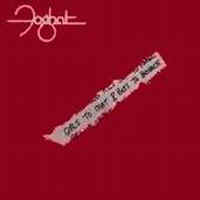
Girls To Chat & Boys To Bounce - 1981
By the time Girls to Chat & Boys to Bounce hit record stores in 1981, it had been
ten years since Foghat had released their first American single "I Just Want to Make
Love to You," and even though the veteran London blues/boogie rock outfit had a
rather long list of commercial accomplishments, the wavering quality and focus of their
music in the late '70s had shaken the band's core fan base and slight critical appeal. The
stomp and the swagger were replaced by glitter and global tours, rust turned to chrome,
howlin' blues to raunch and roll. So bandleader Lonesome Dave Peverett continued an
experiment he had tentatively begun a year earlier on Tight Shoes: drawing on new musical
influences from the burgeoning punk and new wave scene in and around London. While not
exactly a new wave recording, certain tracks on the Bearsville release, especially the ode
to London pub thuggery "Wide Boys," are decidedly minimal, modern, and just
plain un-bluesy. In general, the arrangements on the record are sparse, the songs and
solos are short, and the sound is tighter throughout - with tracks like "Let Me Get
Close to You," "Wide Boys," and "Delayed Reaction" being the best
examples of the bizarre commingling of a Elvis Costello influence with Foghat's reflexive
blues sensibilities. An interesting effort, Girls to Chat & Boys to Bounce might
actually captivate extremely open-minded new wave fans and Foghat completists. - Vincent
Jeffries
1 - (2:48) Wide Boy
2 - (5:36) Let Me Get Close To You
3 - (6:12) Live Now - Pay Later
4 - (5:17) Love Zone
5 - (6:17) Delayed Reaction
6 - (5:16) Second Childhood
7 - (4:09) Weekend Driver
8 - (3:37) Sing About Love

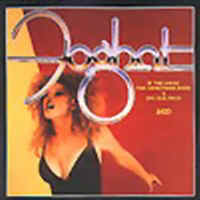
In The Mood For Something Rude - 1982
After two almost desperate but respectable attempts at early-'80s relevance, Foghat
ditched the new wave accents they tried on during their first two releases of the decade,
Tight Shoes and Girls to Chat & Boys to Bounce, choosing instead to give their
trademark blues-rock treatment to a few favorite R&B covers on 1982's In the Mood for
Something Rude. In the five recordings released after Foghat's 1977 double platinum live
record, the band was now attempting to create a third identity for itself, and although
Lonesome Dave Peverett (lead vocals/guitars,) Erick Cartwright (guitars/vocals), Nick
Jameson (bass, keys, percussion), and Roger Earl (drums) proved themselves capable arena
rockers, new wavers, and now R&B/blues revivalists, the multiple personality disorder
cost the group many fans and might have made them appear desperate. Although the
abovementioned condition is significant, it should not overshadow the quality and
musicality demonstrated on In the Mood for Something Rude. While the list of listeners
anxious to hear dinosaur-rock treatments of songs like James Brown's "And I Do Just
What I Want" was perhaps rather short, those interested might enjoy the fluid, thick
guitars and (relatively) soulful vocals on this track and other highlights like Rodney
Crowell's "Ain't Livin' Long Like This." Produced by Jameson and band manager
Tony Outeda, In the Mood for Something Rude, suffers a bit due to a somewhat muddled
sound, but overall, the band's 12th record is a well-executed, high-spirited romp
featuring some classic American songs. - Vincent Jeffries
1 - (5:53) Love Rustler
2 - (3:48) Bustin' Up Or Bustin' Out
3 - (4:22) Slipped, Tripped, Fell In Love
4 - (5:00) Ain't Livin' Long Like This
5 - (3:49) There Ain't No Man That Can't Be Taught
6 - (3:12) Take This Heart Of Mine
7 - (4:40) Back For A Taste Of Your Love
8 - (3:24) And I Do Just What I Want

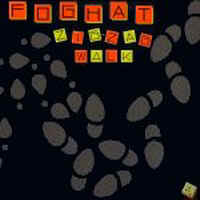
Zig-Zag Walk - 1983
The 13th release, and the final to appear on Bearsville records, Zig-Zag Walk is an
extension of Foghat's backslide into blues- and R&B-based guitar rock. With the glory
years well behind them in 1983, the band was content to churn out this rather unremarkable
yet competent recording of stripped-down boogie rock. Original members Lonesome Dave
Peverett (lead guitars/vocals) and Roger Earl (drums) are joined on this 1983 release by
longtime contributors Erick Cartwright (guitars) and Nick Jameson (bass, keyboards).
Standout tracks include "That's What Love Can Do" and "Down the Road a
Piece." Equal parts good-time rock & roll and effusive musical mating calls,
Zig-Zag Walk is far from the finest Foghat foray on vinyl (or silicon, where it has been
packaged as a reissue with a similar release from the previous year, In the Mood for
Something Rude), but not a bad piece of plastic if you're inclined to enjoy the sound of
Brits toying with American boogie. - Vincent Jeffries
01 - (4:01) That's What Love Can Do
02 - (3:34) Zig Zag Walk
03 - (2:49) Choo Choo Ch'Boogie
04 - (4:43) Jenny Don't Mind
05 - (4:02) Three Wheeled Cadillac
06 - (3:35) It'll Be Me
07 - (3:24) Silent Treatment
08 - (2:41) Down The Road A Piece
09 - (4:16) Seven Day Weekend
10 - (3:48) Linda Lou

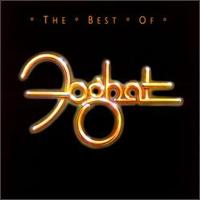
The Best Of Foghat - 1990
Rhino's Best of Foghat is an excellent 16-track collection featuring every one of the
hard-rocking boogie band's best-known songs, from "Slow Ride" and "I Just
Want to Make Love to You" to "Fool for the City," "Drivin'
Wheel," and "Ride, Ride, Ride." In short, it's all the Foghat most fans
will ever need. - Stephen Thomas Erlewine
01 - (4:22) I Just Want To Make Love To You
02 - (3:35) Maybellene
03 - (4:29) Ride, Ride, Ride
04 - (4:59) Take It Or Leave It
05 - (5:00) Home In My Hand
06 - (4:32) Drivin' Wheel
07 - (3:31) Fool For The City
08 - (3:59) Slow Ride
09 - (4:01) Stone Blue
10 - (4:24) Honey Hush
11 - (5:36) Nightshift
12 - (5:30) Wild Cherry
13 - (4:15) Third Time Lucky (First Time I Was A Fool)
14 - (3:57) Easy Money
15 - (6:19) Chateau Lafitte '59 Boogie
16 - (6:06) Eight Days On The Road

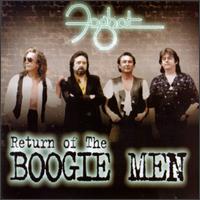
Return Of The Boogie Men - 1994
After many years apart, the original Foghat lineup of vocalist/guitarist Lonesome Dave
Peverett, lead and slide guitarist Rod Price, bassist Tony Stevens, and drummer Roger Earl
reunited and released the appropriately titled Return of the Boogie Men in 1994. The
re-formation was instigated by fan Rick Rubin, noted producer and founder of American
Recordings. Return of the Boogie Men is a mixed bag of excellent-to-average originals and
electric and acoustic blues covers. Foghat thanks Rubin in the liner notes for pointing
the band back to original influences such as Muddy Waters and Elmore James for
inspiration. "Jump That Train" is rip-snorting hard rock with wicked slide
guitar from Price and inspired singing from Peverett; this fun tune even received a little
bit of radio airplay. Waters' "Louisiana Blues" begins and ends acoustically
with Blues Traveler's John Popper guesting on harmonica, but the tough electric middle
section includes greasy slide guitar. "Motel Shaker" is melodic blues-rock and
it's the second best song on the album after "Jump That Train." A four-song
acoustic portion includes Willie Dixon's "I Just Want to Make Love to You," Al
Green's "Take Me to the River," Arthur "Big Boy" Crudup's "That's
Alright Mama," and Big Bill Broonzy's "Feel So Good." Foghat performs
Dixon's song much slower than they did on their two revved up electric hit studio and live
versions. Return of the Boogie Men and 1998's live Road Cases unexpectedly became Foghat's
final two albums when Peverett died of kidney cancer in 2000. - Bret Adams
01 - (5:20) Jump That Train
02 - (5:51) Louisiana Blues
03 - (4:42) Motel Shaker
04 - (5:07) Play Dirty
05 - (4:53) Nothin' But Trouble
06 - (4:00) Talk To Me Baby
07 - (4:22) I Just Want To Make Love To You
08 - (5:19) Take Me To The River
09 - (4:22) That's Alright Mama
10 - (3:07) Feel So Good
11 - (5:37) I Just Want To Make Love To You
12 - (4:28) Writing On The Wall

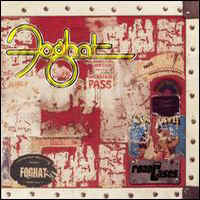
Road Cases - 1998
This 76-minute collection of live cuts from two live shows in Oregon during 1996 starts
off a little ominously, in terms of the beat that the group uses on "I Just Want to
Make Love to You," abut Rod Price's guitar carries the day and the group does well
enough on the old blues-rock standard, stretched out to nearly ten minutes. Unfortunately,
there isn't a lot of variety in the sound of Lonesome Dave Peverett's singing, which is
good, but not quite good enough to sustain interest across over an hour of largely
original material. The material offers some variation - the most attractive songs here are
the Chess-based material, which includes "Chevrolet," an undisguised Bo Diddley
variation, but the group does better with originals like "Soakin' the Bone"
(itself a Jimmy Reed rip-off). The material is well-recorded, and fans of Rod Price's
guitar will definitely not feel short-changed by the mix or the mastering. - Bruce Eder
01 - (10:01) I Just Want To Make Love To You [Live]
02 - (7:27) Drivin' Wheel [Live]
03 - (4:26) Chevrolet [Live]
04 - (4:04) Soakin' The Bone [Live]
05 - (7:53) Sweet Home Chicago [Live]
06 - (6:19) Rock Your House [Live]
07 - (8:10) It Hurts Me Too [Live]
08 - (4:18) Bad Bad Lovin' [Live]
09 - (5:10) Fool For The City [Live]
10 - (9:29) Slow Ride [Live]
11 - (5:13) Angel Of Mercy [Live]
12 - (4:55) Tear You Down [Live]

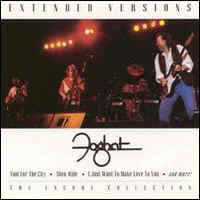
Extended Versions - 2001
01 - (5:15) Louisiana Blues [Live]
02 - (6:42) Drivin' Wheel [Live]
03 - (5:33) Nothin' But Trouble [Live]
04 - (7:51) Stone Blue [Live]
05 - (6:18) Rock Your House [Live]
06 - (11:01) It Hurts Me Too [Live]
07 - (7:52) Sweet Home Chicago [Live]
08 - (9:17) I Just Want To Make Love To You [Live]
09 - (5:28) Fool For The City [Live]
10 - (9:37) Slow Ride [Live]

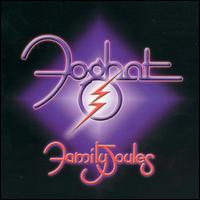
Family Joules - 2003
01 - (4:23) Mumbo Jumbo
02 - (4:51) Hero To Zero
03 - (5:42) Thames Delta Blues
04 - (4:11) Flat Busted (And Out Of Gas)
05 - (3:14) I Feel Fine
06 - (5:39) I'm A Rock 'N Roller
07 - (4:08) Hit The Ground Running
08 - (4:46) Looking For You
09 - (3:40) Long Time Coming
10 - (4:20) Sex With The Ex
11 - (7:35) Self-Medicated
12 - (4:16) Mean Voodoo Woman
13 - (1:23) Voodoo Woman Blues

|